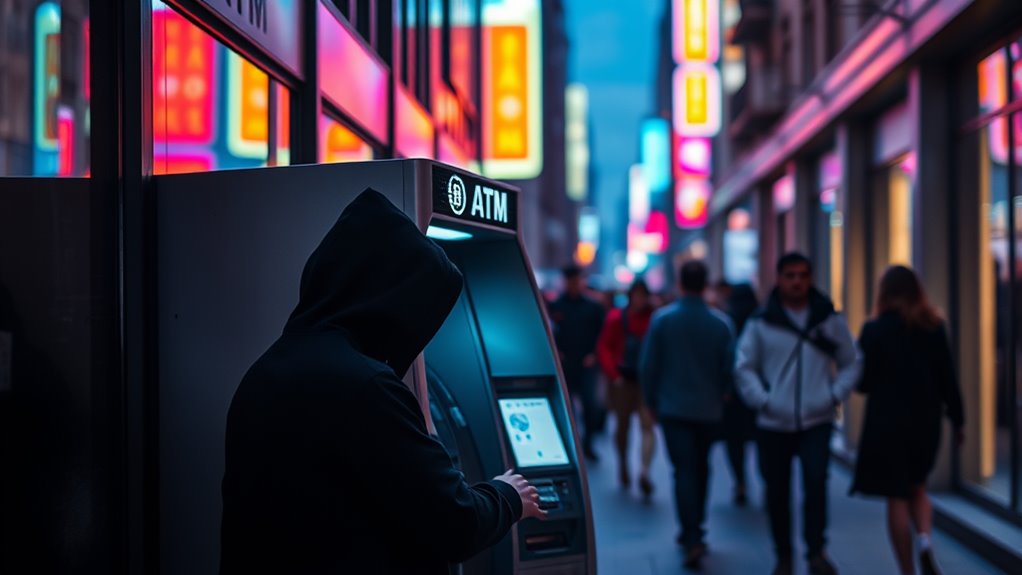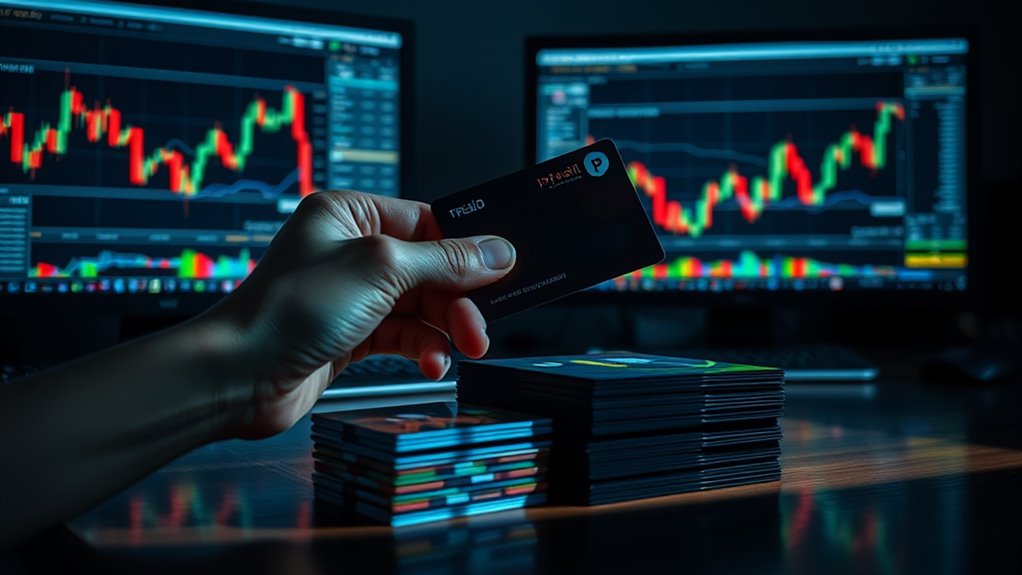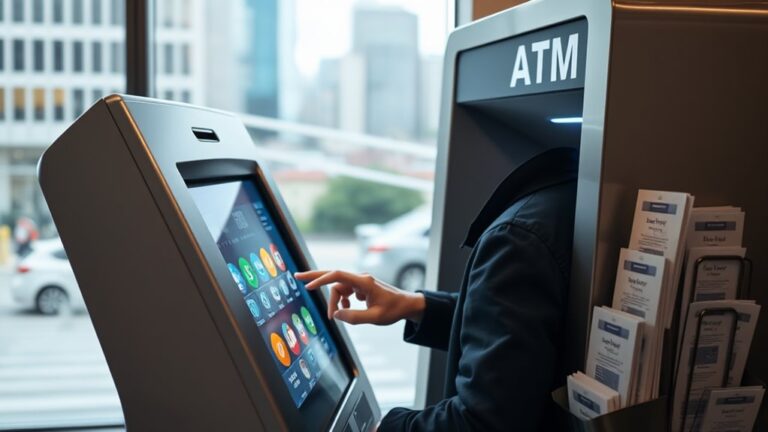
Buying Crypto Anonymously: Top Methods & Challenges
To buy cryptocurrency anonymously, individuals often use peer-to-peer exchanges, Bitcoin ATMs, prepaid debit or gift cards, and privacy coins. Each method offers varying levels of anonymity, with peer-to-peer platforms and privacy coins providing substantial privacy, while Bitcoin ATMs and prepaid cards offer less stringent ID requirements. However, these methods come with challenges such as potential scams, regulatory scrutiny, and higher transaction costs. By further exploring these avenues, one can navigate the complexities of maintaining anonymity in crypto transactions.
Key Takeaways
- Utilize P2P crypto exchanges for direct transactions while minimizing personal data exposure and regulatory scrutiny.
- Bitcoin ATMs provide anonymity in cash-to-crypto exchanges, though subject to traceable blockchain activity and surveillance.
- Purchase cryptocurrencies with prepaid debit or gift cards to avoid stringent KYC protocols, yet remains under regulatory watch.
- Opt for privacy coins like Monero that use advanced technologies to obscure transaction details and identities.
- Despite these methods, risks include potential scams, limited protection, and the challenges of converting crypto to regulated fiat anonymously.
Exploring Peer-to-Peer Crypto Exchanges

While exploring the world of cryptocurrency, it is essential to understand peer-to-peer (P2P) crypto exchanges and how they operate. These platforms facilitate direct transactions between buyers and sellers without an intermediary, enhancing user privacy due to minimal regulatory oversight. Unlike traditional exchanges, many P2P platforms are non-custodial, meaning they do not hold users' funds, which reduces risk but increases user responsibility. To secure transactions and protect against fraud, some P2P exchanges use escrow services. In addition, these platforms are globally accessible and often support various payment methods, making them available to users without traditional bank accounts. Overall, P2P crypto exchanges offer a decentralized approach to buying and selling cryptocurrencies, prioritizing privacy and financial autonomy. To better evaluate and choose the appropriate platform, users are encouraged to consider the transaction security and verification processes, which vary across different P2P trading platforms.
The Role of Bitcoin ATMs in Maintaining Anonymity

Building on the topic of alternative methods to acquire cryptocurrency while maintaining privacy, the role of Bitcoin ATMs emerges as a notable option.
These machines allow users to exchange cash for cryptocurrencies like Bitcoin through a straightforward process that involves depositing cash and receiving crypto via a scanned QR code linked to their wallets.
Although these ATMs offer a degree of anonymity by possibly requiring minimal identification, they still present challenges.
While Bitcoin ATMs may offer limited anonymity, they come with several privacy challenges.
All transactions are logged on the blockchain, which, while encrypted, can be traced with sophisticated analysis.
Additionally, the presence of security cameras at some locations and regulatory requirements for data retention can further compromise user anonymity.
Transaction limits at more private machines may also hinder larger purchases.
Using Prepaid Debit and Gift Cards

Many individuals turn to prepaid debit and gift cards as effective tools for anonymous online transactions.
Prepaid debit cards, often lacking identity verification requirements, can be loaded with cash and used for purchasing cryptocurrencies. They incorporate encryption for transaction security, though they're subject to regulatory scrutiny.
Gift cards enhance anonymity further as they require no identification and can be bought with cash, leaving minimal digital traces. However, while gift cards are versatile, accepted by numerous online vendors, they're not universally usable like prepaid cards.
Both card types face regulatory hurdles and security challenges.
Platforms like SimpleSwap facilitate Bitcoin purchases with prepaid cards without stringent KYC, offering a straightforward, though potentially risky, avenue for cryptocurrency acquisition.
The Importance of Privacy Coins for Anonymous Transactions

As cryptocurrencies continue to evolve, privacy coins have gained prominence due to their enhanced anonymity features.
These coins, such as Monero and Zcash, employ technologies like ring signatures and zero-knowledge proofs to shield transaction details, thereby obscuring identities and transaction histories. This functionality not only heightens privacy but also guarantees fungibility, where individual units of the currency are interchangeable, reducing the risk of transaction history affecting the value of coins.
Despite the advantages, these coins face significant challenges, including regulatory scrutiny and lower adoption rates, as they are often associated with illicit activities.
Nevertheless, their role in supporting financial privacy and business confidentiality remains critical.
A new sentence with decentralized finance and smart contract technology is also reshaping how privacy coins operate, further enhancing their security and autonomous capabilities.
Employing Anonymity Enhancing Tools and Techniques

To maintain anonymity when purchasing or trading cryptocurrencies, it is critical to utilize a variety of privacy-enhancing tools and techniques.
- Privacy-Focused Wallets: Incorporate features like coin mixing and additional security layers; examples include Wasabi Wallet's CoinJoin and Samurai Wallet's Whirlpool.
- Coin Mixing Services: Services like ChipMixer use methods such as CoinJoin to obscure transaction paths, though users must be cautious of potential scams.
- Decentralized Exchanges (DEXs): Facilitate KYC-free transactions, allowing trades directly from personal wallets which enhance user privacy.
- Anonymity Networks (VPNs and Tor): Both tools mask IP addresses and route internet traffic to preserve user anonymity during online transactions.
Understanding the Risks and Security Challenges

Why do anonymous crypto transactions come with considerable risks and security challenges?
Anonymous purchasing of cryptocurrency, such as through Bitcoin ATMs or peer-to-peer platforms, thankfully prevents personal data exposure but these methods often attract scammers.
The decentralized nature of blockchain networks, while promoting privacy, does not completely obscure transaction histories, making traced activities possible.
Blockchain decentralization enhances privacy yet transaction histories remain partially visible, exposing activities to potential scrutiny.
Decentralized exchanges and non-traditional payment conduits, like gift cards, provide limited buyer protection, elevating the potential for fraud.
High transaction costs and the problematic transfer of anonymously acquired crypto into regulated fiat currencies or platforms further complicate the security landscape.
Finally, user dependence on personal diligence to vet transaction partners or platforms increases the risk of encountering fraudulent scenarios.
To counter these risks, it's crucial to adopt strong passwords and two-factor authentication, strategies that increase security measures against unauthorized access.
Navigating Regulatory Impact on Anonymous Crypto Purchases

Maneuvering the regulatory impact on anonymous crypto purchases reveals a complex landscape where governments worldwide endeavor to impose controls that address potential legal and security risks entailed by privacy-oriented digital currencies.
- KYC and AML Compliance: Governments enforce these regulations to deter financial crimes, necessitating user verification which compromises anonymity.
- Consumer Protection: Regulatory bodies prioritize consumer safety, influencing the viability of privacy-focused cryptocurrencies that complicate tracking and transparency.
- Technological Evolution: Privacy-enhancing technologies and decentralized platforms present challenges but are essential for maintaining user anonymity against stringent oversight.
- International Coordination: Disparate global regulations necessitate international cooperation to manage the intricate balance between privacy rights and preventing illicit activities.
Frequently Asked Questions
How Can I Recover Anonymously Sent Bitcoins if Misplaced?
To recover misplaced anonymously sent bitcoins, one can utilize seed phrases, access private keys, or retrieve the wallet.dat file using specialized software. Consulting professional recovery services, though costly, may also assist in retrieval efforts.
What Is the Minimum Transaction Size for Bitcoin ATMS?
Amidst the bustling world of digital transactions, one wonders: what limitations bind Bitcoin ATMs? Intriguingly, the minimum transaction size typically begins at $20, but variations arise depending on the specific policies of operators.
How Long Do Coin Mixers Typically Take to Process Transactions?
Coin mixers' transaction processing times vary considerably, typically ranging from minutes to several hours. Factors including mixer type, network congestion, and desired anonymity levels influence the duration of the mixing process.
Are There International Legal Repercussions for Using Privacy Coins?
International legal repercussions for using privacy coins vary by country. Some nations may impose sanctions, while others ban or restrict their use, especially where concerns of money laundering or tax evasion are prevalent.
How to Verify the Legitimacy of a Non-Custodial Exchange?
To verify the legitimacy of a non-custodial exchange, one might scrutinize user reviews, assess the platform's security features, and examine its compliance with regulatory standards, much like checking a map before a long journey.
Conclusion
Despite the appeal of purchasing cryptocurrency anonymously, various challenges and risks are inherent. While methods like peer-to-peer exchanges or Bitcoin ATMs offer some privacy, regulatory pressures and potential security vulnerabilities cannot be ignored. It is vital to weigh the convenience of anonymity against these risks. Ultimately, staying informed and cautious guarantees safer transactions. Overcoming obstacles, such as a steep learning curve, is manageable with proper guidance and understanding of the crypto landscape.














